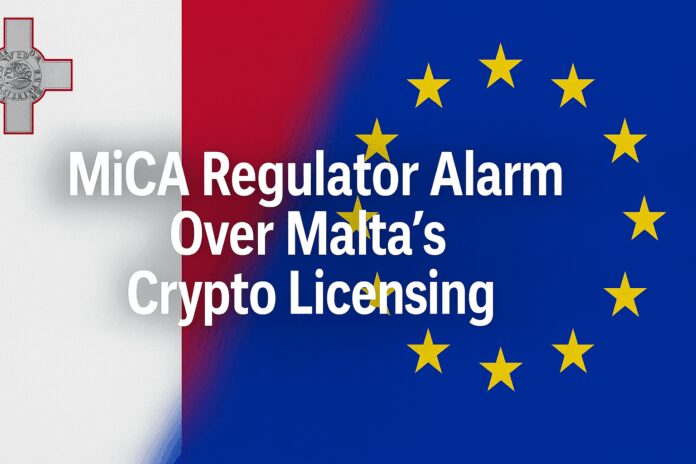Malta, once dubbed the “Blockchain Island,” is under renewed scrutiny after the European Securities and Markets Authority (ESMA) and the European Banking Authority (EBA) expressed concern over how the island nation is handling crypto licensing ahead of the MiCA transition. As reported by Cointelegraph, EU regulators fear that Malta’s process may inadvertently pave the way for regulatory arbitrage under the incoming Markets in Crypto-Assets (MiCA) framework.
This development could have major implications for crypto firms seeking EU-wide approval via “passporting” — and for the integrity of MiCA’s implementation across all 27 member states.
What’s the Issue? Malta’s Fast-Track May Undermine EU Consistency
Malta has allowed crypto service providers already licensed under its Virtual Financial Assets (VFA) regime to transition into MiCA authorization via an expedited process. This includes skipping parts of the licensing review process that would otherwise apply to new applicants.
According to Cointelegraph’s reporting, the concern is not just about the timeline — it’s about substance:
- Did all firms under the VFA regime meet the rigorous governance and risk requirements expected under MiCA?
- Could fast-tracked approvals allow weaker firms to gain EU-wide access via Malta’s gateway?
- Is Malta’s regulator conducting sufficient due diligence to avoid undermining EU financial stability?
Why This Matters: MiCA Passporting Is a Double-Edged Sword
MiCA was designed to harmonize crypto regulation across the EU, with one key feature being the passporting mechanism. Once a crypto firm is authorized under MiCA in one EU country, it can operate across the entire bloc.
This system is intended to:
- Reduce regulatory fragmentation
- Provide legal clarity to crypto businesses
- Increase consumer protection and market integrity
But it also introduces a single point of failure risk: if one country applies lenient standards, it could open the floodgates for substandard providers to enter all EU markets — especially if not properly audited or supervised.
That’s exactly what ESMA and EBA are now worried about in Malta’s case.
Malta’s Dilemma: Crypto Hub or Compliance Weak Spot?
Malta’s ambition to remain a crypto-friendly jurisdiction is well-documented. But in the post-MiCA era, national strategies must align with EU-wide risk mitigation. The challenge for Malta is to strike a balance between:
- Maintaining its crypto industry appeal
- Avoiding reputational damage with EU regulators
- Ensuring its supervisory framework can stand up to MiCA scrutiny
Failure to do so may result in regulatory isolation, as ESMA has already hinted that it may step in if any member state is seen to threaten the level playing field MiCA is meant to create.
Conclusion: Regulatory Harmonization Must Not Become a Loophole
The concerns around Malta’s licensing process serve as a warning:
MiCA’s strength lies in consistency — not in optional leniency.
If Malta becomes a “backdoor” into the European crypto market, it could weaken trust in the entire regulatory regime. EU regulators appear determined to prevent this, signaling that passporting rights will come with heightened oversight and ongoing monitoring.
As the MiCA regime goes live across Europe, the real test will be whether national regulators can align with both the letter and spirit of the law — without giving way to national competitive interests.




